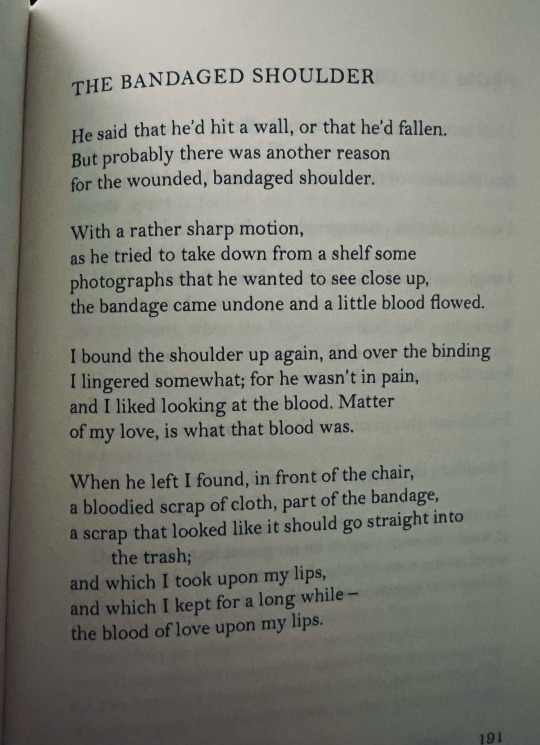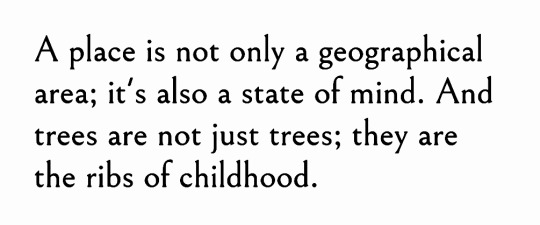#c.p. cavafy
Text

David Hockney (British, b. 1937)
Two boys aged 23 or 24 (Illustrations for Fourteen Poems from C.P. Cavafy), 1966
Etching and aquatint on paper
199 notes
·
View notes
Quote
When we say "Time" we mean ourselves. Most abstractions are simply our pseudonyms. It is superfluous to say, "Time is scytheless and toothless". We know it. We are time.
C.P Cavafy, marginalia on John Ruskin in Cavafy: A Critical Biography by Robert Liddell
596 notes
·
View notes
Quote
When they saw Patroklos dead
–so brave and strong, so young–
the horses of Achilles began to weep;
their immortal nature was upset deeply
by this work of death they had to look at.
They reared their heads, tossed their long manes,
beat the ground with their hooves, and mourned
Patroklos, seeing him lifeless, destroyed,
now mere flesh only, his spirit gone,
defenseless, without breath,
turned back from life to the great Nothingness.
C.P. Cavafy, “The Horses of Achilles,” from Collected Poems (translated by Edmund Keeley and Philip Sherrard)
#Achilles#Patroclus#Patroklos#Horses of Achilles#C.P. Cavafy#Guess what I'm reading right now?#I found a copy of Cavafy's poems at a used bookstore and had to buy it.#Too bad that there's a nude mosaic of Dionysus on the cover so that I can't get away with reading it in public!#Modern Greek#translation#not my translation#Edmund Keeley#Philip Sherrard#poem#poetry#quote#Iliad#mythology#death
81 notes
·
View notes
Text

From C.P. Cavafy Poems- 1919
I’ve absolutely fallen in love with Cavafy’s poetry over the course of the year. I stumbled across this poem while flipping through this book for the thousandth time the other night, and it just reminds me so much of the boys, particularly post-GWA⛤
26 notes
·
View notes
Text

















hometown blues
arcade fire, suburban war | rachel kahn, i know this | noah kahan, the view between villages | the lumineers, sleep on the floor | phoebe bridgers, i know the end | fatimah asghar, how did your parents die again | i know the end | c.p. cavafy, the city (tr. edmund keeley) | the view between villages | mahmoud darwish, journal of an ordinary grief | i know the end | lorde, 400 lux | noah kahan, paul revere | sidney gish, homecoming serf | i know the end | hanif abdurraqib, poems from an email exchange | alec holowka, die anywhere else
#web weaving#words#poetry#hanif abdurraqib#mahmoud darwish#noah kahan#phoebe bridgers#rachel kahn#arcade fire#c.p. cavafy#fatimah asghar#the lumineers#lorde#alec holowka#sidney gish#my posts
16 notes
·
View notes
Text

In Despair, Constantine P. Cavafy
[text ID: He's lost him utterly, as if he'd never been. / In his imagination, in his hallucinations / in the lips of other youths he seeks the lips of that one; / He wishes that he might feel his love again.]
#c.p. cavafy#constantine p. cavafy#cavafy#poetry#poet#poem#quote#lgbt#classic literature#classical literature#literature#greek#translated#quotes#fragment#excerpt#lit#my post
203 notes
·
View notes
Photo

A little stack of poetry
228 notes
·
View notes
Text
My life has been awaiting you. Your footfall was my own heart's beat.
—C.P. Cavafy
11 notes
·
View notes
Text
"You said: “I’ll go to another country, go to another shore, / find another city better than this one."
Read it here | Reblog for a larger sample size!
#closed polls#polls#poetry#poems#poetry polls#poets and writing#tumblr poetry#have you read this#the city#cp cavafy#c.p. cavafy#konstantinos kavafis
14 notes
·
View notes
Text


“𝑎𝑛𝑑 𝑚𝑦 ℎ𝑒𝑎𝑟𝑡, 𝑙𝑖𝑘𝑒 𝑠𝑜𝑚𝑒𝑡ℎ𝑖𝑛𝑔 𝑑𝑒𝑎𝑑, 𝑙𝑖𝑒𝑠 𝑏𝑢𝑟𝑖𝑒𝑑 𝑖𝑛𝑠𝑖𝑑𝑒 𝑚𝑒.”
—C.P. Cavafy, The City
#poets on tumblr#dark academia#aesthetic#spilled poetry#words#spilled ink#spilled thoughts#19th century#vintage#love poem#dark acadamia aesthetic#dark academia books#renaissance art#renaissance#poetry#dark academia lovers#vintage classics#dark acdemia#sylvia plath#c.p. cavafy
62 notes
·
View notes
Text
The City - C.P. Cavafy - Greece
Translators: Edmund Keeley, Philip Sherrard (Greek)
You said: “I’ll go to another country, go to another shore,
find another city better than this one.
Whatever I try to do is fated to turn out wrong
and my heart lies buried like something dead.
How long can I let my mind moulder in this place?
Wherever I turn, wherever I look,
I see the black ruins of my life, here,
where I’ve spent so many years, wasted them, destroyed them totally.”
You won’t find a new country, won’t find another shore.
This city will always pursue you.
You’ll walk the same streets, grow old
in the same neighborhoods, turn gray in these same houses.
You’ll always end up in this city. Don’t hope for things elsewhere:
there’s no ship for you, there’s no road.
Now that you’ve wasted your life here, in this small corner,
you’ve destroyed it everywhere in the world.
27 notes
·
View notes
Text
national poetry month, day 26
The God Abandons Antony
When suddenly, at midnight, you hear
an invisible procession going by
with exquisite music, voices,
don’t mourn your luck that’s failing now,
work gone wrong, your plans
all proving deceptive—don’t mourn them uselessly.
As one long prepared, and graced with courage,
say goodbye to her, the Alexandria that is leaving.
Above all, don’t fool yourself, don’t say
it was a dream, your ears deceived you:
don’t degrade yourself with empty hopes like these.
As one long prepared, and graced with courage,
as is right for you who proved worthy of this kind of city,
go firmly to the window
and listen with deep emotion, but not
with the whining, the pleas of a coward;
listen—your final delectation—to the voices,
to the exquisite music of that strange procession,
and say goodbye to her, to the Alexandria you are losing.
—C.P. Cavafy (trans. by Edmund Keeley and Philip Sherrard)
#c.p. cavafy#edmund keeley#philip sherrard#the god abandons antony#poetry#national poetry month#npm2024#frankly shocked it took me so long to post this poem
3 notes
·
View notes
Text
The God Abandons Antony By: C.P. Cavafy
When suddenly, at midnight, you hear
an invisible procession going by
with exquisite music, voices,
don’t mourn your luck that’s failing now,
work gone wrong, your plans
all proving deceptive—don’t mourn them uselessly.
As one long prepared, and graced with courage,
say goodbye to her, the Alexandria that is leaving.
Above all, don’t fool yourself, don’t say
it was a dream, your ears deceived you:
don’t degrade yourself with empty hopes like these.
As one long prepared, and graced with courage,
as is right for you who proved worthy of this kind of city,
go firmly to the window
and listen with deep emotion, but not
with the whining, the pleas of a coward;
listen—your final delectation—to the voices,
to the exquisite music of that strange procession,
and say goodbye to her, to the Alexandria you are losing.
2 notes
·
View notes
Text
C.P. Cavafy

Selected Poems
Translated by David Connolly
BILINGUAL EDITION
Cavafy is by far the most translated and most well-known Greek poet internationally. His work exists in multiple translations in a wide range of languages and major 20th-century poets as diverse as Auden, Brecht, Brodsky, Durrell, Milosz and Montale have all paid tribute to Cavafy, either by writing poems ‘in the style of Cavafy’, or by openly admitting their debt to his poetry in their own work.
Whether his subject matter is historical, philosophical or sensual, Cavafy’s unique poetic voice is always recognizable by its ironical, suave, witty, world-weary and aesthetic tones. It is a voice which lends itself to translation. Indeed, translations of Cavafy’s poetry are the best possible counter to the often quoted platitude that poetry is what is lost in translation. Cavafy’s is a poetry that not only survives but actually thrives in translation.
Τhe inventor of a modernity and an Alexandrianism of his own, so pungent and of such sad, dry elevation that his work transcends his language and his century.
— Robert Fitzgerald
Poet and Translator
His complete sincerity, his angular stance to the world, his tenderness that is combined with the accuracy of a surgeon, his awareness of the past in the present and of the present in the past, his meticulousness, his grandeur – these are some of the qualities which no reader can fail to observe and which, singly and together, make him one of the greatest writers of our times.
— Rex Warner
Classicist and Translator
2 notes
·
View notes
Text
Returning from Greece
Well, we’re nearly there, Hermippos.
Day after tomorrow, it seems—that’s what the captain said.
At least we’re sailing our seas,
the waters of Cyprus, Syria, and Egypt,
the beloved waters of our home countries.
Why so silent? Ask your heart:
didn’t you too feel happier
the farther we got from Greece?
What’s the point of fooling ourselves?
That would hardly be properly Greek.
It’s time we admitted the truth:
we are Greeks also—what else are we?—
but with Asiatic affections and feelings,
affections and feelings
sometimes alien to Hellenism.
It isn’t right, Hermippos, for us philosophers
to be like some of our petty kings
(remember how we laughed at them
when they used to come to our lectures?)
who through their showy Hellenified exteriors,
Macedonian exteriors (naturally),
let a bit of Arabia peep out now and then,
a bit of Media they can’t keep back.
And to what laughable lengths the fools went
trying to cover it up!
No, that’s not at all right for us.
For Greeks like us that kind of pettiness won’t do.
We must not be ashamed
of the Syrian and Egyptian blood in our veins;
we should really honor it, take pride in it.
(Translated from the Greek by Edmund Keeley and Philip Sherrard)
#poetry#Konstantinos Kavafis#Constantine Cavafy#C.P. Cavafy#Cavafy#Greek poetry#Edmund Keeley#Philip Sherrard#Greece#home#alienation#homesickness#Syria#Egypt#Alexandria#Cyprus#assimilation#immigration#unease#cultural diversity#cultural alienation#immigrant songs
4 notes
·
View notes
Text
City poets are by nature passive, the way flypaper is passive. The formula for Juvenal’s Rome or Whitman’s New York is look hard, listen hard, record. But all the real action in Alexandria had gone down a couple of thousand years earlier, and so the city had to be worked out in Cavafy’s head.
[...] Cavafy thought of himself as a “poet-historian,” which meant that he viewed all human conduct, his own included, in the light of recorded time. When Ezra Pound called the Cantos a “poem containing history,” he exempted his poem itself from history, and the second sense of “containing” applies as well: the Cantos are a kind of quarantine of the past. But in Cavafy history is the container: individuals rattle around inside it like pennies in a can. Cavafy believed that you couldn’t “remember” history no matter what you did, and, in any case, you weren’t “condemned to repeat it,” because it had never gone away. All of the modernist sententiae about history with a capital “H” seemed silly to Cavafy, whose lovers were envoys to the whole Hellenic past.
(x)
56 notes
·
View notes